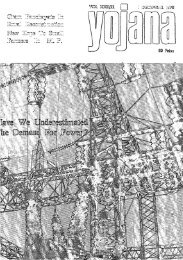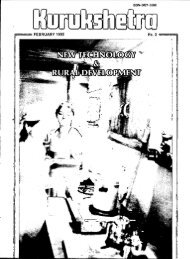Banking - Yojana
Banking - Yojana
Banking - Yojana
- TAGS
- banking
- yojana
- yojana.gov.in
Create successful ePaper yourself
Turn your PDF publications into a flip-book with our unique Google optimized e-Paper software.
Generated by PDFKit.NET Evaluation<br />
•<br />
The established marketing<br />
companies have pipelines and<br />
storage facilities, but they have to<br />
make huge investments to expand<br />
these facilities for their own needs.<br />
New entrants will have to build new<br />
facilities as soon as possible.<br />
Moreover, so far risks were<br />
almost nil in marketing, as<br />
companies had fixed margins and<br />
prices fixed under APM. Now the<br />
companies have to deal with risks<br />
including price risk for crude oil,<br />
refining margins and foreign<br />
exchange risks. Assured margins<br />
are now a thing of the past and<br />
companies will need to adopt<br />
global risk management practices<br />
to protect their margins.<br />
Oil companies at present source<br />
import crude oil through tenders<br />
which is a time consuming process.<br />
This does not reflect, the prevailing<br />
market prices, which fluctuate on<br />
a daily basis. All international<br />
majors like Shell, Exxon, Mobil<br />
and Chevron have energy trading<br />
departments which monitor crude<br />
prices on daily basis to protect the<br />
company from price fluctuations<br />
and reduce the impact on their net<br />
profits.<br />
In this situation, also, public<br />
sector oil companies are now better<br />
placed in the deregulated regime.<br />
It would be two to three years before<br />
their market leadership is<br />
• challenged by new private en tran ts.<br />
The retail marketing margins of<br />
oil companies is expected to go up<br />
by one per cent in the new era of<br />
free market pricing, according oil<br />
industry experts. Margin expansion<br />
would be highest in retail<br />
automotive fuels of diesel and<br />
petrol, the areas of real<br />
competition. The automotive fuels<br />
account for nearly 50 per cent of<br />
the total volume sales. The domestic<br />
diesel sales stood at 40 million<br />
tonnes, while that of petrol was at 8<br />
million tonnes during 2001-02.<br />
Kerosene sales accounted for 10<br />
million tonnes during the year.<br />
India's total consumption of<br />
petroleum products during 2001-02<br />
is estimated at 100 million tonnes.<br />
Net imports of petrol and diesel<br />
stood at 3 million tonnes.<br />
Products Import<br />
Though petroleum sector was<br />
deregulated from April 1, imports<br />
of petroleum products particularly<br />
petrol and diesel, have not been<br />
freed and would continue to be<br />
routed through designated State<br />
Trading Enterprises (STEs). "The<br />
country is surplus in refining<br />
capacity and we see no point in<br />
flooding the domestic markets with<br />
imports," Petroleum Ministry<br />
officials said. While import of crude<br />
oil was decanalised last year, imports<br />
of petroleum products would<br />
continue to be' regulated.<br />
"Industrial slowdown has created<br />
exportable surplus in the country.<br />
There is no logic in allowing<br />
imports when we are looking at<br />
export markets, particularly for<br />
diesel," official sources said.<br />
Dismantling of the administered<br />
pricing mechanism has freed the<br />
pricing of petroleum products and<br />
allowed private sector companies to<br />
enter lucrative retail marketing of<br />
petrol and diesel.<br />
Companies who have invested or<br />
propose to invest Rs. 2,000 crore in<br />
creating oil infrastructure like<br />
refinery, pipeline and terminals are<br />
eligible for setting up retail network<br />
but they would have to source the<br />
products locally. "We are studying<br />
the implications of opening up of<br />
the sector after over three decades<br />
of administrative controls. Imports<br />
of petrol and diesel would be<br />
allowed only after we established<br />
norms ,of a free market and a<br />
credible regulatory mechanism is<br />
established," sources said. Sources<br />
said the Petroleum Ministry was<br />
contemplating whether imports of<br />
petroleum products, if allowed,<br />
should be through Open General<br />
License (OGL) or some basic<br />
minimum conditions be imposed<br />
on the imports.<br />
Even though the quantitative<br />
restrictions on international trade<br />
have been removed, the<br />
government could retain the<br />
imports and exports of petroproducts<br />
through STEs, as the<br />
WTO rules permit the same.<br />
The long awaited deregulation<br />
of the Petroleum sector has come<br />
about. But from the consumers'<br />
point of view, there is hardly any<br />
evidence of deregulation at work.<br />
That is in marked contrast to the<br />
happenings in the other key sector,<br />
the telecommunication industry,<br />
which has been opened up<br />
simultaneously. All types of<br />
telecom users are already reaping<br />
the benefits of competition.<br />
Telephone tariff has been coming<br />
down rapidly continuing a trend<br />
that began a few months earlier. In<br />
contrast, the retail prices of<br />
petroleum products have not<br />
changed significantly since Aprill.<br />
In a deregulated environment they<br />
are supposed to be determined by<br />
market forces and consequently<br />
reflect the international price<br />
movement.<br />
More importantly, there will not<br />
be a transformation from a<br />
controlled regime to a market<br />
dominated one eve'n over the next<br />
few months. The government will<br />
continue to have a decisive say in<br />
theprices of the big four petroleum<br />
products- petrol, diesel, LPG and<br />
kerosene. Part of the reason as to<br />
why changes have been so few has<br />
to do with the complex nature of<br />
the institutional ari-angements in<br />
the hydrocarbon sector and its<br />
YOJANAJuly 2002 21<br />
Click here to unlock PDFKit.NET






